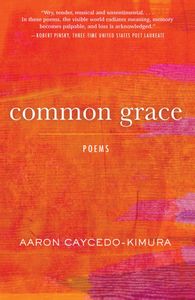 Poetry alum Aaron Caycedo-Kimura (Poetry ’20)’s debut collection Common Grace was released today by Beacon Press! To celebrate the book’s release, current program administrator Annaka Saari (Poetry ’21) was able to interview Aaron about the collection via email. Read below to hear more about how Aaron organized the collection and how he approached using the histories of the living and the dead to craft the poems within it.
Poetry alum Aaron Caycedo-Kimura (Poetry ’20)’s debut collection Common Grace was released today by Beacon Press! To celebrate the book’s release, current program administrator Annaka Saari (Poetry ’21) was able to interview Aaron about the collection via email. Read below to hear more about how Aaron organized the collection and how he approached using the histories of the living and the dead to craft the poems within it.
Annaka Saari: Common Grace is divided into three separate sections: “Soul Sauce,” “Ubasute,” and “Gutter Trees.” “Soul Sauce,” the first section in the book, explores your life as an artist, while “Ubasute” and “Gutter Trees,” the second and third sections, explore the lives of your late parents and your relationship with your wife. How did you decide where you wanted readers to enter this complex of lives that are intertwined with each other?
Aaron Caycedo-Kimura: When reading a poetry book, I go in automatically wanting and expecting to learn something about the author. That’s what interests me most. So, I thought it made sense to start with introducing myself, giving the reader a little clue as to who I am, what I do, where I am in life, and how I see things. Starting this way would help give the reader some insight into the relationships I expand upon later in the book.
AS: What was the biggest challenge you encountered in writing and organizing the poems in Common Grace?
ACK: Common Grace wasn’t a project book where I set out to write about a particular topic or set of topics. It’s a selection of poems from a nine-year period when I happened to be writing a lot about my parents, my wife Luisa, the life we’ve built together, as well as other personal experiences. The poems grouped themselves, but I think the biggest challenge was trying to balance the sections. Most of the writing was about my parents, since their deaths were still fresh and heavy in my thoughts. My father passed away in 2011 and my mother in 2015. I primarily balanced out the sections by writing several new poems.
AS: How did your practices as a visual artist have an effect on the way you approached this collection, if at all?
ACK: Generally speaking, I think the way I approach painting, has influenced the way I approach writing. I’ve always been a “maker,” so the way I paint feels more like constructing or sculpting. I build my images with individual strokes, each one holding information: tone, temperature, intensity, and color. Likewise, the way I write a poem feels more like “making” a poem, constructing it with words, each one having sound, tone, and meaning. The difference is that a painting tends to be more planned. Since I paint representational work, I have a good idea what the painting’s design will be before I start. A poem is more fluid. It can take the writer to unexpected places, sometimes even changing form.
AS: Did you find a difference in the way you as a writer engaged with the histories of deceased individuals as to the way in which you worked with material from the lives of those still living?
ACK: Whether a person is deceased or living, I always try to approach the material with respect. With the poems I wrote about my parents, I really wanted to honor them, while keeping them in a believable, human light. With poems about those living, like ones about Luisa, I try to check with the person when I can to make sure that what I’m sharing is OK. I have a couple of poems in the book, one that mentions my uncle (“Autumnal Equinox”) and one that concerns my aunt (“Solidarity”), who have both passed away. I felt compelled to check with my cousin, their daughter, to confirm that the poems were ok with her. She didn’t like one thing in an earlier version of “Solidarity” and suggested a change. It turned out to be a good change.
Those interested can purchase a copy of Common Grace at this link.
